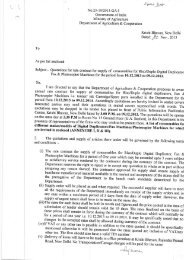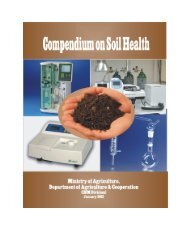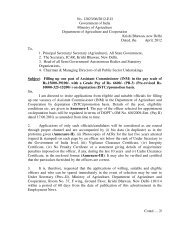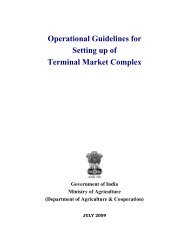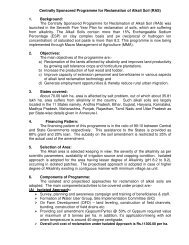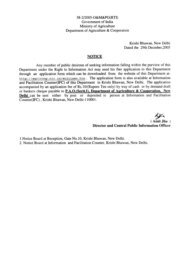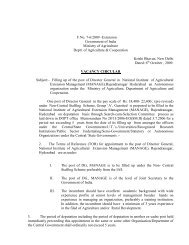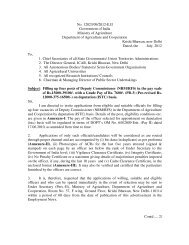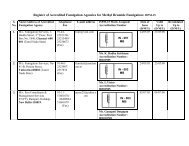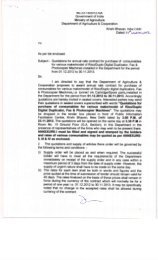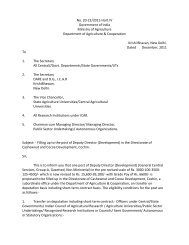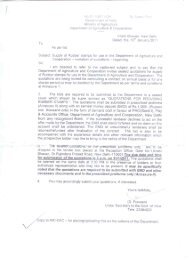Annual Report 2009-2010 - Department of Agriculture & Co-operation
Annual Report 2009-2010 - Department of Agriculture & Co-operation
Annual Report 2009-2010 - Department of Agriculture & Co-operation
Create successful ePaper yourself
Turn your PDF publications into a flip-book with our unique Google optimized e-Paper software.
narrowcasting centres, 18 regional centres and<br />
one national centre <strong>of</strong> Doordarshan Kendra<br />
telecasts agricultural programmes for 30<br />
minutes, five days a week. Programmes <strong>of</strong><br />
regional kendras and some narrowcasting<br />
centres are being repeated the next day on the<br />
respective regional satellite channels. Audio and<br />
video spots on emerging issues, namely, Rabi/<br />
Kharif campaign, Kisan Call Centres, Kisan Credit<br />
Cards, etc., are also publicised through the<br />
programme using free commercial time. Live<br />
crop seminars on Doordarshan involving farmers<br />
and experts have also been organised.<br />
9.18 The other component <strong>of</strong> the mass media<br />
initiative is the use <strong>of</strong> 96 FM transmitters <strong>of</strong> AIR<br />
to broadcast area specific agricultural<br />
programmes with 30 minute radio transmissions<br />
in the evening, six days a week.<br />
9.19 Establishment <strong>of</strong> Agri-Clinics and Agri-<br />
Business Centres by <strong>Agriculture</strong> Graduates: The<br />
ACABC scheme was launched in April 2002, with<br />
the aim <strong>of</strong> providing extension and other services<br />
to farmers on a payment basis; supplementing<br />
agricultural development and entrepreneurship;<br />
and promoting self-employment in the<br />
agriculture sector by setting up agri-ventures in<br />
agriculture and allied areas. These agri-preneurs<br />
are actively involved in providing consultancy and<br />
extension advisory services to farmers at the<br />
grass roots level. The selected graduates are<br />
sponsored to undergo two months' training<br />
through MANAGE at various identified Nodal<br />
Training Institutes (NTIs), which also provide<br />
hand-holding support for one year. NABARD<br />
supports the Ministry <strong>of</strong> <strong>Agriculture</strong> in disbursing<br />
credit-linked back ended subsidies at the rate <strong>of</strong><br />
25 per cent <strong>of</strong> the capital cost <strong>of</strong> the project<br />
funded through bank loans, as well as a full<br />
interest subsidy for the first two years on bank<br />
credit through the concerned branches <strong>of</strong><br />
commercial banks/financial institutions. The<br />
subsidy is given at the rate <strong>of</strong> 33 per cent in<br />
respect <strong>of</strong> candidates belonging to SCs and STs,<br />
women, and other disadvantaged sections, and<br />
those from North Eastern states. So far, 20,228<br />
agriculture graduates have been trained and 7151<br />
agri-ventures have been established in the<br />
country during the period <strong>of</strong> implementation <strong>of</strong><br />
the scheme (from its inception up to February<br />
<strong>2010</strong>.).<br />
9.20 Pre-seasonal DAC-ICAR Interfaces: Preseasonal<br />
DAC-ICAR Interfaces are organised<br />
under the co-chairmanship <strong>of</strong> the Secretary (A&C)<br />
and Director General (DG), ICAR, to evolve joint<br />
strategies on emerging issues in the agriculture<br />
sector. During the interface, both the <strong>Department</strong><br />
<strong>of</strong> <strong>Agriculture</strong> and <strong>Co</strong><strong>operation</strong> (DAC) and the<br />
Indian <strong>Co</strong>uncil <strong>of</strong> Agricultural Research (ICAR)<br />
share a common platform to deliberate upon<br />
various recommendations made by expert<br />
groups in different areas. Actions taken on the<br />
recommendations <strong>of</strong> the previous interface are<br />
also reviewed. The participants in the DAC-ICAR<br />
Interface are senior <strong>of</strong>ficers from the DAC,<br />
<strong>Department</strong> <strong>of</strong> Animal Husbandry, Dairy, and<br />
Fisheries (AHD&F), and the ICAR. The 29th DAC-<br />
ICAR Interface in the series was organised on<br />
17 August <strong>2009</strong>, and was mainly focused on<br />
developing strategies to mitigate the effects <strong>of</strong><br />
drought on crop production in the country.<br />
<strong>Co</strong>pies <strong>of</strong> the proceedings and group<br />
recommendations <strong>of</strong> the said interface were<br />
circulated to all the concerned divisional heads<br />
<strong>of</strong> the DAC, DAHD&F, ICAR, all the states, and<br />
related institutes, for necessary follow-up action.<br />
The Pre-Kharif Interface for <strong>2009</strong>-10 was held on<br />
11 February, <strong>2010</strong>.<br />
9.21 Kisan Call Centers: The scheme was<br />
launched on 21 January 2004 to provide<br />
agricultural information to the farming<br />
community through toll-free telephone lines. A<br />
country-wide common eleven digit number<br />
'1800-800-1551' has been allocated for KCCs.<br />
Replies to queries <strong>of</strong> the farming community are<br />
being given in 22 local languages. Calls are<br />
attended from 6.00 a.m. to 10.00 p.m., on all<br />
seven days <strong>of</strong> the week. Since the inception <strong>of</strong><br />
the scheme, over 39.65 lakh calls have been<br />
received. During the current year, around 6.89<br />
lakh calls have been received up to 31 October<br />
<strong>2009</strong>. In order to make farmers aware <strong>of</strong> this<br />
facility, audio and video spots on Kisan Call<br />
Centres have been broadcast/telecast through<br />
All India Radio and Doordarshan; publicity to KCC<br />
Agricultural Extension<br />
53



